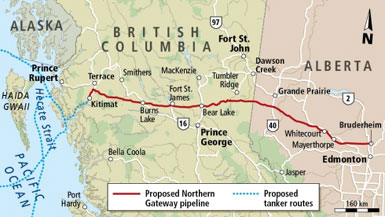Ignoring widespread protests and blockades, Canada has approved the Northern Gateway pipeline, which would transport tar sands oil through British Columbia to the Pacific coast for export.
The $5.5-billion project involves two pipelines that would stretch over 1,177-kilometers from Alberta to a port in northern British Columbia, carrying 525,000 barrels of oil a day.
Enbridge, which would build the pipeline is best known for its tar sands spill in Michigan’s Kalamazoo river, and is less well known for its 800+ spills since 1999.

The decision faces numerous court challenges from First Nations and anger from people living in British Columbia – which rejected the pipeline. 130 First Nations are committed to preventing the pipeline and all have banned tar sands extraction, pipelines and tankers in their territories.
"We fully expect the Harper government to make every effort to ram this project through. But there’s enormous solidarity here in British Columbia between First Nations people, British Columbians, Canadians, and we’ll do what’s necessary and whatever it takes to stop this project," says Stewart Phillip, president of the Union of British Columbia Indian Chiefs.
"Just like Keystone XL, the Northern Gateway pipeline faces widespread opposition from the people whose land, water, and livelihoods would be threatened by the prospect
of a disastrous tar sands spill. Regardless of the Harper Administration’s approval, that opposition is only growing stronger. Mayors don’t want it. Unions don’t want it. First Nations across BC don’t want it. Scientists don’t want it. The only people in BC who want this pipeline are Enbridge and the Harper government. This pipeline will not be built," says Dr. Tzeporah Berman, Canadian author and environmentalist.
Although the pipeline would take just three years to build, even it if somehow ends up going forward it will be delayed for many years given all the measures planned against it.
Brent Patterson, Political Director of the Council of Canadians says these strategies will be used:
Blockade: tribes are building and living in homes in the pipeline’s path and given the mountainous terrain re-routing isn’t possible.
Court Challenges: Five court challenges have been filed in federal courts, and about seven more are expected. Their primary argument is that the government failed to meet its legal obligation of consulting with First Nations, since the pipeline would traverse their land. They also didn’t consider the impact of potential oil spills or climate change in their conclusion that the pipeline won’t have a significant adverse environmental effect.
Civil Disobedience: The British Columbia Civil Liberties Association is holding workshops to instruct people on their rights in protests against the pipeline. At the request of local groups, workshops have already been offered in many communities.
Referendum:
The Dogwood Initiative plans to bring it up for a vote in British Columbia and is gathering signatures. If over 50% of voters reject the pipeline, it would have to approved by a bill in the legislature.
Defeat Conservatives in Elections:
Forest Ethics Advocacy and Leadnow have launched the ‘Enbridge 21’ campaign to hold the 21 conservative members of British Columbia’s parliament accountable.
Prime Minister Harper has gutted Canada’s environmental laws, muzzled and fired top scientists, and threatened environmental organizations as terrorists. Now, government weather forecasters are prohibited from publicly discussing climate change.
And Europe is caving to Harper, accepting their first major shipment of tar sands oil in Spain this month – 570,000 barrels. The EU’s "Fuel Quality Directive" (same as California’s) targets 6% lower greenhouse gases from fuel by 2020. It prioritizes fuels by carbon intensity, but they seem to be scrapping that, thanks to years of lobbying by Canada.
About 4,000 barrels a day of tar sands oil is imported to Europe, according to the Natural Resource Defense Council. If all the planned pipelines get built, that would grow to over 700,000 barrels a day by 2020, they say.
In March, a pipeline from Alberta to Montreal was approved, which could extend through New England, and Flanagan South is under construction in the Midwest.
Read our article, Harper Budget Overturns Canada’s Environmental Laws for Oil Industry.

